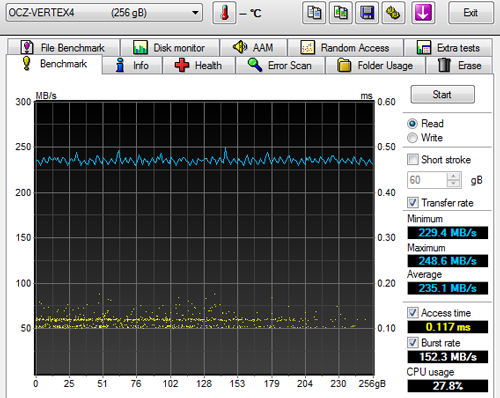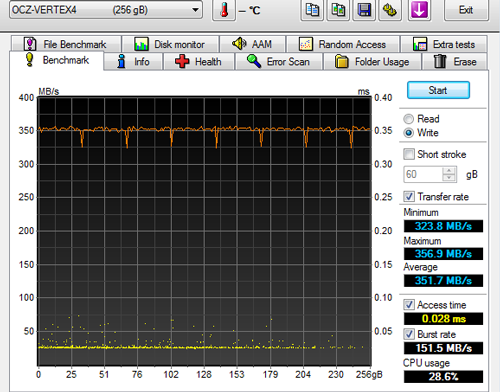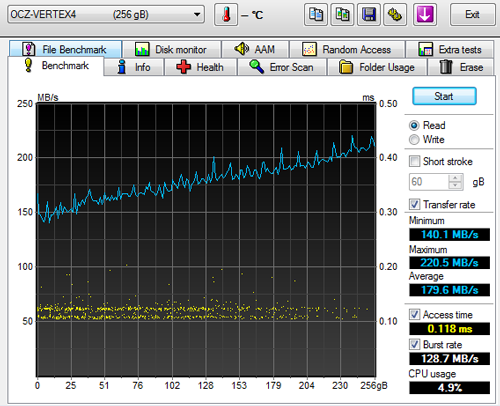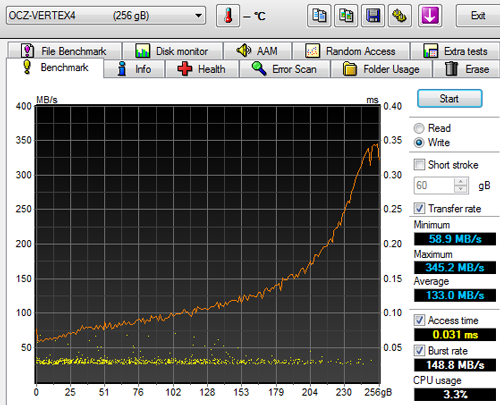OCZ Vertex 4 Review: A Flagship SSD Powered By...Indilinx?
Examining Steady State Performance (Worst-Case)
Clean Performance
Determining how an SSD is expected to perform over time requires “dirtying” it by filling user-accessible space with an incompressible sequential write. The point is to replicate a worst-case situation, where every available block has been written-to, leaving nothing free for the controller to use without first performing garbage collection.
Torture Performance
Worst-case steady-state performance testing involves writing over a full drive with 4 KB random writes. Because the drive is already packed, the controller doesn't have any empty blocks available. Writing again with sequential data forces garbage collection to occur, making this a far more strenuous exercise than the preceding test. This is important aspect of performance to inspect because it confirms the existence of efficient garbage collection. Because the Vertex 4 doesn't dedicate any capacity to over-provisioning, it's an especially critical metric to run.
We noticed that the original Everest controller (used to drive the Octane) primarily employed foreground garbage collection. That isn't the case with OCZ's Vertex 4.
The graphs above and below reveal a nice gradual performance recovery as garbage collection kicks in. Of course, in the real world, you probably won't see such an extreme situation where all blocks are dirty. More likely is that you'll have some free space available for the controller to use during idle periods for garbage collection. Combined with regularly emptying your Recycle Bin, triggering the TRIM command, you're almost assured to not see our worst-case scenario.
Get Tom's Hardware's best news and in-depth reviews, straight to your inbox.
Current page: Examining Steady State Performance (Worst-Case)
Prev Page Power Consumption: 128 KB Sequential (Windows 7/Mac OS X) Next Page Real World Performance: File Copy And Boot Times-
compton Octane was not a special and unique snowflake; Indeed, someone else's fingerprints were all over it. Vertex4 is certainly unique, but I fully expect the next round of drive launches using Marvell products to look like the V4, but possibly with some more balance.Reply -
billybobser Seems to good to be true.Reply
We'll see how they are once they've been out in the open for 6 months when problems will/will not flare up. -
maxinexus As Billy said only time will tell. These preliminary tests are great and pricing is better but still SSD are expensive...we need to get to cents not dollars per GB. Anyway good start OCZ...now the only thing you need is your own NANDs...perhaps in few yearsReply -
jgutz2006 This is a great step and makes financial sense for OCZ to come to market with a competitive product and possibly undercut all the others. Its a no brainer im my world. Force Samsung to sell units with less profit marginsReply -
Branden it'll be interesting to see how reliable these drives are and what their failure rate is going to be. OCZ's vertex 2 and 3 drives were horribly unreliable - in my experience 50% failure/DOA rate, my local shop said they see about 10% of them returned due to failure (and that's just within their 2 week return window alone).Reply
sorry OCZ, you've lost my business this time around. i've since replaced all my remaining OCZ SSD's with crucial m4's, they may not quite perform as well as your latest offerings but in my experience reliability > performance. -
JackNaylorPE When I built Son No.2 's box, we installed the Seagate Barracuda XT on Friday and measured boot times at 21.2 seconds to the Password entry screen. The Vertex 3 arrived on Monday and after installing that, we measured boot times at 15.6 seconds. Not commenting on the actual times as differences in hardware as well as testing parameters could push it in any direction, but what I will comment on is the HD choice for this test.Reply
My testing showed it took 36% extra time to boot off the HD instead of the HD. This test has it taking 226 % longer. If we're gonna test the best SSD's, I'd sure like to see a best in class HD added to the comparisons. -
burnley14 Brandenit'll be interesting to see how reliable these drives are and what their failure rate is going to be. OCZ's vertex 2 and 3 drives were horribly unreliable - in my experience 50% failure/DOA rate, my local shop said they see about 10% of them returned due to failure (and that's just within their 2 week return window alone).sorry OCZ, you've lost my business this time around. i've since replaced all my remaining OCZ SSD's with crucial m4's, they may not quite perform as well as your latest offerings but in my experience reliability > performance.It's interesting because so many people have talked about how unreliable they are, but in my personal experience (a small sample size, granted) I've been very pleased with both the Vertex 2's performance and reliability and the Agility 3's. Maybe I'm just lucky.Reply -
drwho1 all I read was: support for 2TB... *drooling*Reply
Price for 2TB SSD?
*not drooling anymore* -
OntarioHero Hmmm. Basically OCZ decided "Indilinx too slow! sod it, stick 1GB buffer in there!"Reply



